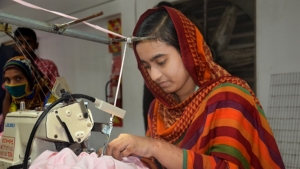This Is Unfolded: Reducing Poverty in Southeast Asia
 At the start of the COVID-19 pandemic in 2020, major clothing retailers in the U.K. canceled $2 billion worth of garment orders. This was despite the fact that the garments had already been manufactured. The canceled orders left millions of textile workers in Bangladesh without pay, potentially facing extreme poverty. In response to this crisis, Cally Russell, a fashion businessman, set up the ‘Lost Stock’ scheme. It involved selling the unclaimed stock and donating close to half of the proceeds to textile workers. Later, Lost Stock evolved into ‘This Is Unfolded’, a fashion brand that works to reduce poverty in Southeast Asia.
At the start of the COVID-19 pandemic in 2020, major clothing retailers in the U.K. canceled $2 billion worth of garment orders. This was despite the fact that the garments had already been manufactured. The canceled orders left millions of textile workers in Bangladesh without pay, potentially facing extreme poverty. In response to this crisis, Cally Russell, a fashion businessman, set up the ‘Lost Stock’ scheme. It involved selling the unclaimed stock and donating close to half of the proceeds to textile workers. Later, Lost Stock evolved into ‘This Is Unfolded’, a fashion brand that works to reduce poverty in Southeast Asia.
Lost Stock – How Did It Work?
The Lost Stock scheme was a partnership between Cally Russell’s shopping app Mallzee and the SAJIDA Foundation, based in Bangladesh. The SAJIDA Foundation, set up in 1993, has supported more than 6 million individuals in becoming entrepreneurs and lifting themselves out of poverty. Lost Stock purchased abandoned clothing orders and gave customers the opportunity to buy a ‘mystery box’ of clothing. Each box cost about $49, and customers offered details regarding their size, gender and personal style to the organization. Lost Stock then selected three items worth over $85 altogether and sent them to the customer a few weeks later.
For every purchased box, Lost Stock and the SAJIDA Foundation were able to financially support one garment worker and their family for seven days. In 2020, the Lost Stock initiative financially aided 113,000 people for more than a month, ensuring that garment workers did not starve or succumb to poverty. Moreover, the initiative reduced textile waste by not allowing the canceled garment orders to deteriorate in a landfill.
Evolution to This Is Unfolded
After the success of the Lost Stock scheme, the organization transformed into This Is Unfolded, a sustainable clothing brand intent on reducing poverty in Southeast Asia. It adopts a slow approach to clothes manufacturing in a bid to reduce waste production and in turn, ensure that less harm comes to the planet. After receiving an order, team members develop small collections of 20 items or less to ensure that supply does not outweigh demand. Customers receive items straight from the production factories. This method of manufacturing allows the team to save money on delivery and production costs. Consequently, it is able to price items at around 80% of the price of clothing from major high-end retailers.
Perhaps more significantly, the brand uses these savings to pay garment workers a fair wage, employing 379 workers in Indian factories that use ethical manufacturing practices and instill a safe, positive working environment. The brand also pays bonuses to its full staff after the completion of each clothing collection, fully compensating workers to help them avoid falling into poverty.
Efforts to Aid in Child Literacy
In India, 26% of the population is illiterate. Since 1995, the educational charity Pratham has worked to increase literacy rates in India. In education centers, children who have never been to school or who experienced educational disruptions receive basic literacy and writing lessons. For every sold garment, This Is Unfolded funds a child to receive literacy lessons in a Pratham education center for at least one month. So far, it has supported 3,500 children in learning to read and write.
Concluding Thoughts
This Is Unfolded has made admirable progress in lowering textile waste and reducing poverty in Southeast Asia. From its origins as Lost Stock, it made certain that thousands of garment workers did not experience extreme poverty. It now makes strides to ensure that child literacy rates reach 100% in India. The organization’s work is beneficial to both the global population and the planet. It also serves as an inspiration to other clothing retailers who can also join the efforts to make positive marks on the planet.
– Mohsina Alam
Photo: Flickr
